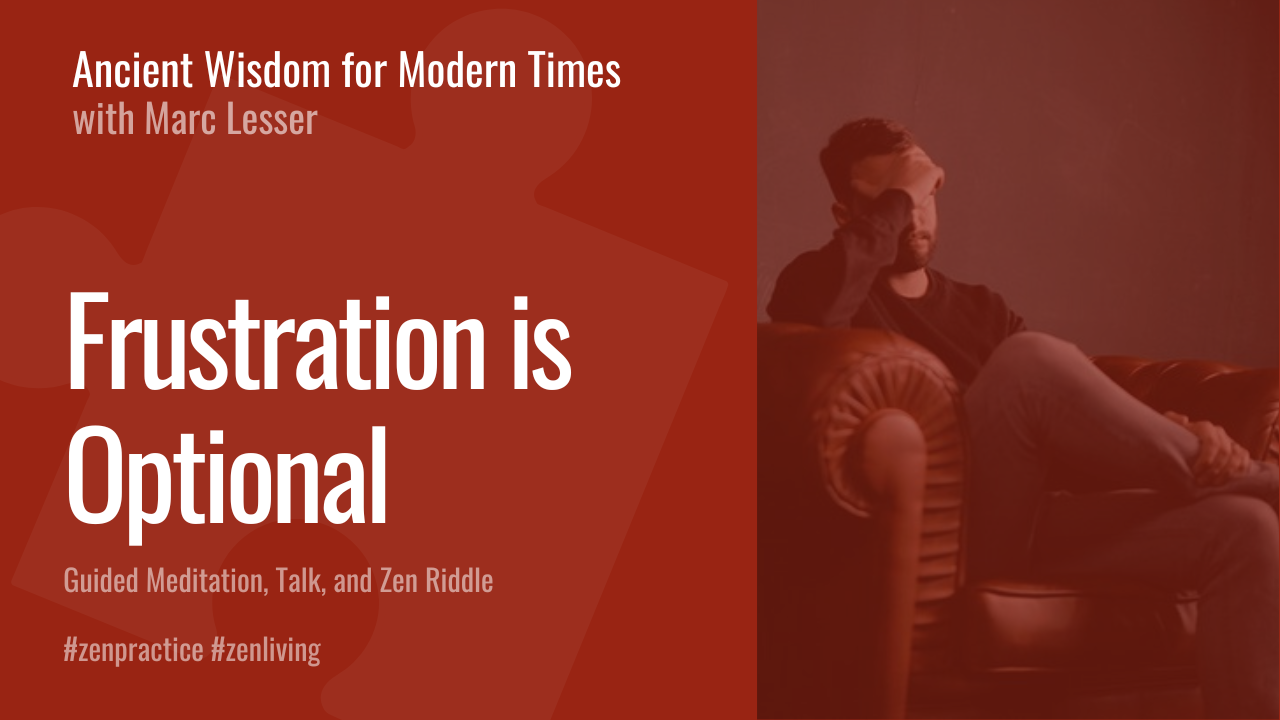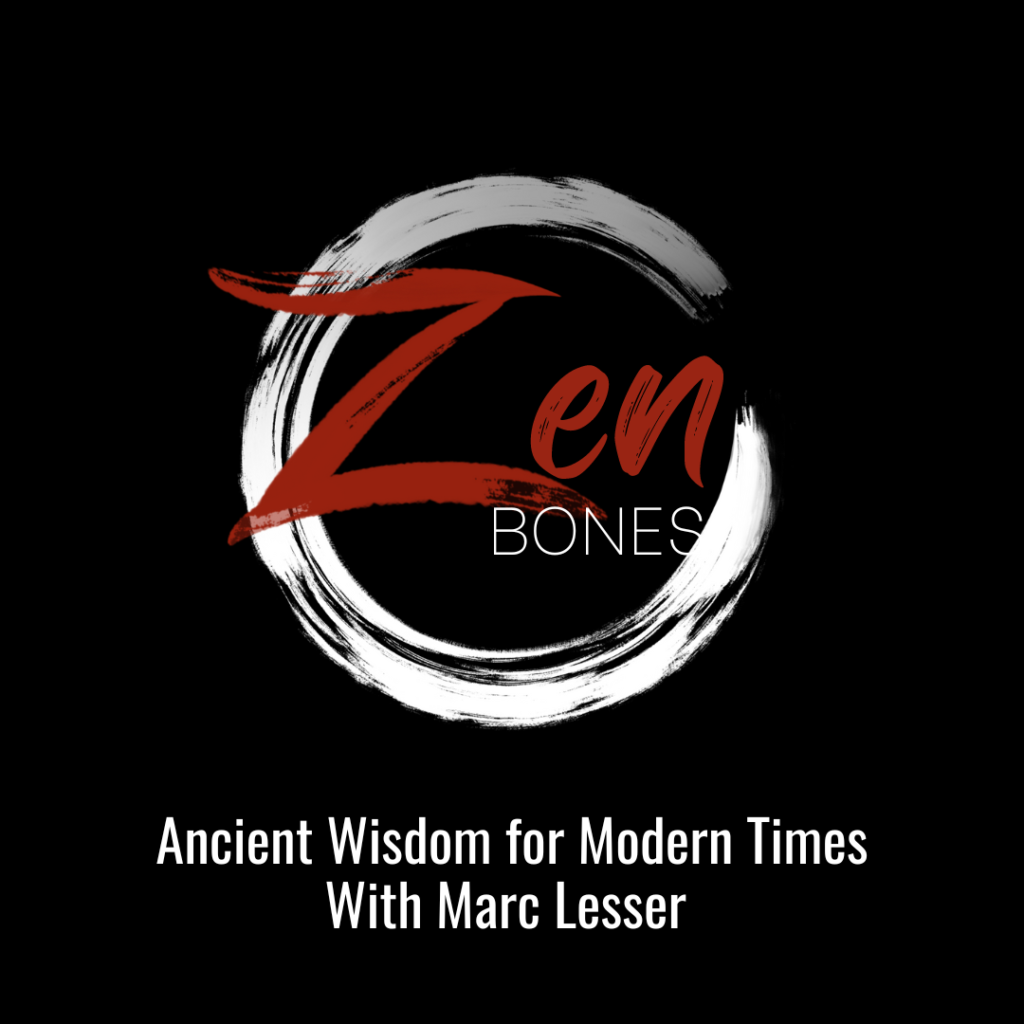There is no shortage of frustration in our daily lives. In this episode, we begin with a short meditation, followed by a short talk about effective ways to shift from frustration to acceptance and appreciation. Marc shares one of his favorite poems by Tony Hoagland.
Today’s Zen puzzler comes from the teachings of Zen teacher Shunryu Suzuki. Marc helps the listener unpack various ways to consider and answer the question: What is the most important point for you right now?
EPISODE TRANSCRIPT
[music]
Marc Lesser: Welcome to Zen Bones: Ancient Wisdom For Modern Times, this is Marc Lesser. Why Zen Bones? Our world is in crisis and ever-shifting, and now more than ever, more wisdom, clarity, and courage are essential, especially in the world of work, business, and leadership. Today’s practice episode is around the theme of frustration is optional. There is no shortage of frustration in our daily lives. To help with this we begin with a short meditation and then talk about effective ways to shift from frustration to greater acceptance and appreciation.
I share one of my favorite poems by Tony Hoagland and then move into today’s Zen puzzler that comes from the teachings of Zen teacher, Shunryu Suzuki, who often talked about the most important point. What is the most important point to you right now? I hope you enjoy today’s episode.
[music]
Let’s do a few minutes of sitting practice. Stopping, pausing, arriving, nothing special and also pretty extraordinary this ability that we humans have to pause. Wherever you are, whatever you might be doing, seeing if it’s possible too. Open, sometimes this is opening, sometimes this is focusing, but right now, why don’t we bring attention to the fact that breathing is happening without us having to do anything, just bringing attention to the breath? With a child-like curiosity, what is this breath?
With that question of course comes, what is this life? What is this experience of being here now breathing, letting thoughts come and let them go, like clouds in the sky or like the waves on top of the ocean, and coming back? Coming back to the ground, to the ocean, coming back to our true nature. Whatever is most present, relevant, important, letting go of our to-do lists, letting go of any sense of frustration or anything lacking right now. Right now, there’s nothing needed, nothing lacking. What does it feel like? What does it feel like in the body to be fully here, fully present, and fully satisfied?
I’ve been reading this book to my three-year-old grandson, the book is called Filling Your Cup. I think meditation practice is like the practice of filling up or emptying out whatever metaphor works for you, but filling your cup with satisfaction, with safety, with being connected and emptying of frustration, emptying of any sense of lack. Cultivating the mind of appreciation and the mind of acceptance, warmhearted acceptance right now right here. What is it like to be alive? What is it like to be here right now? Nothing special and yet and yet, and you feel the sacredness of this moment, this life, this breath. Please feel free to pause and continue sitting or come on back and join me here.
[music]
I want to talk about the practice of letting go of frustration. Frustration, I think, is this sense of entitlement or discomfort that things are not how we want them to be. Lately, I’ve become a student of frustration, and I’ve noticed there’s no shortage of events and situations to become frustrated about on many levels. There’s gun violence or climate change or COVID, politics. Then on a closer to home, there’s our work lives, our relationship where everything rarely or never goes as we might want it to go.
People are complicated, really complicated. Why can’t they be simple like you and like me, real simple? I was just speaking recently with a doctor friend who conveyed intense frustration, and the lack of resources, and staffing that several key nurses on his staff had just resigned, and some doctors were away with COVID and the need for services was greater than ever and he was really struggling. How can we find ground? How do we find our sense of well-being without getting caught or drowned by frustration, and stress, and burnout?
I’ve also become, some of you may know, a student of Homer Simpson, a terrific mindfulness and leadership expert, who gives this advice to his daughter, Lisa, when she’s frustrated when things are not going as she wants in her work. Homer says, “Lisa, if you don’t like your job you don’t go on strike. You just go in every day and do it really half-assed, that’s the American way.” Yes, great advice from Homer about how to deal with frustration. Just do it half-assed.
Sometimes it seems like our choice is, especially at work, to either take Homer’s advice which is a kind of giving up to deal with our frustration by letting go of caring, or to be constantly stressed, anxious, frustrated with the challenges and difficulties of communication, collaboration, the goal of engaging in effective and meaningful work. There must be another way, there must be another path. I’ve also been a long-term student of Shunryu Suzuki who is the founder of the San Francisco Zen Center and collection of his talks, Zen Mind, Beginner’s Mind is wonderful, wonderful reading.
He suggests that the most effective way to work with frustration with people and events is to appreciate things and people and that then our minds can become calm and clear. This practice of appreciation, appreciating what is instead of dwelling and getting all worked up about things being not how we want them to be. Of course, this is not easy, this is not easy and I think it’s doing both simultaneously in the gaps. It’s not that we don’t notice the gaps, but it’s a radical sense of acceptance.
I was just on the phone with a friend of mine who’s quite ill, and I was saying, I remember when Shunryu Suzuki was dying and quite ill. He said, “Sometimes I’m a healthy Buddha, sometimes I’m a sick Buddha.” This is that radical sense of acceptance and appreciating whatever is. Zen practice and mindfulness practice start with the inspiration and aspiration that we can use our imaginations and set an intention for how we work and how we live with a more calm and a more clear mind, right in the middle of our challenging, sometimes painful, sometimes seemingly impossible situations.
Our relationship with frustration is something that we can shift and change and reduce and we can aspire to work with a more clear and calm mind, and not get caught by the gaps and the frustrations. This, I think, is an important way to work with more effectiveness and more productivity as well as more joy and happiness. We can’t control other people. We can’t control the events, but we can’t influence and be influenced by other people and events. We can’t even control our minds, but we can work with and develop our minds and our bodies.
This aspiration to have a clear and calm mind, even when our minds are not clear and not so calm. I’m regularly reminding myself that there are events and there’s how we relate to or how we interpret these events. There, of course, will always be problems and challenges and breakdowns and pain and broken hearts, but we don’t need to add extra frustration. My suggestion and this is for myself and as well, is to experiment with exploring and noticing, what if frustration was extra? What if there was some space between the events and how we interpret and live these events? How can we find more radical acceptance and more joy?
I want to share one of my favorite poems. This is a poem by Tony Hoagland called The Word.
Down near the bottom
of the crossed-out list
of things you have to do today,
between “green thread”
and “broccoli”, you find
that you have penciled “sunlight.”
Resting on the page, the word
is as beautiful. It touches you
as if you had a friend
and sunlight were a present
he has sent you from someplace distant
as this morning—to cheer you up
and to remind you that,
among your duties, pleasure
is a thing
that also needs accomplishing.
Do you remember?
that time and light are kinds
of love, and love
is no less practical
than a coffee grinder
or a safe spare tire?
Tomorrow you may be utterly
without a clue,
but today you get a telegram
from the heart in exile
proclaiming that the kingdom
still exists,
the king and queen are alive,
still speaking to their children,
—to anyone among them
who can find the time
to sit out in the sun and listen.
I love the line, “Do you remember that time and light are kinds of love? Do you remember that time and light are kinds of love and love is no less practical than a coffee grinder or a safe spare tire?” Feeling our true nature, the innate sense of a calm mind, even in the midst of difficulties and challenges. Welcome to the Zen Bones puzzler, where I will regularly be presenting a story or a Zen koan or a poem, something to contemplate, to think about, a story that has a purpose. It’s about developing greater insight and reflection, not so much for a solution, but as a way to support your practice, a kind of meditation in daily life.
Today’s Zen puzzler, Zen poem, Zen question is a short statement. This is some words that a Zen teacher Shunryu Suzuki often used. He often started sentences by saying the most important thing or the most important point. Today’s Zen puzzler is, what is the most important point? What is the most important thing? Maybe just contemplating that, thinking about that, journaling about that. What is the most important thing? Of course, I was collecting the number of times that Shunryu Suzuki used this phrase, and I think it’s more than 200 times that he named the most important thing.
Then, of course, one of the best is that that summarizes them all. The most important thing is to know what the most important thing is but some of my favorites that he talked about were the most important thing is to express your true nature in the simplest, most adequate way and appreciate it in the smallest existence. The most important thing is to express your true nature in the simplest, most adequate way, and appreciate it in the smallest existence.
I think this is quite beautiful and works really well as the most important thing to aspire to. In some way, acknowledge that we’re always, no matter what we’re doing, we are expressing our true nature but to do it in a way that is simple and with appreciation, and even in the smallest, the smallest tasks, it’s not about doing any grand gestures. Another statement that he makes is the teaching of love is the most important thing. The teaching of love, right? To feel love, to express love, to love, be loved. I think really all of Buddhism, all of mindfulness practice essentially is about the teaching of love, and in my last book, Seven Practices of a Mindful Leader, the first practice is love. Love the work.
This isn’t just to love the work you’re doing but to love the work of expressing your true nature. To love the work of being human, of opening our hearts, of finding our calm minds. Another one of Suzuki Roshi’s statements is, the most important thing is to forget all gaining ideas, all dualistic ideas. The most important thing is to forget all gaining ideas. How beautiful, simple, and profound.
Again, imagine what our lives would be like if we could. It’s not that we don’t have visions and that we, of course, were always looking to create things, do things, we set goals as we should, but at the same time, to have a mind that can be at rest and not be caught by setting these goals, not be caught by needing anything or doing anything extra. Maybe one more. The most important thing, our effort in our practice should be directed from achievement to non-achievement.
Again, this is particularly challenging for us, especially bringing this into the world of work, but I think of my time working as the Tassajara baker or running the kitchens where there was this sense of the importance of producing great meals or great bread. You start with that aspiration, but at the same time, there’s the sense of service, there’s a sense of love, there’s a sense of just enjoying my hands on the dough or enjoying the knife cutting vegetables, enjoying working with each other and letting go of any sense of achievement or fear of not doing it right. This is an expression of service and love. I think that’s what he means here. The most important thing is to have the right or perfect effort.
Our effort should be directed from achievement to non-achievement, and again, coming back, the most important thing is to know what the most important thing is. This changes, it’s worth coming back to again and again. What is the most important thing?
[music]
Listen in each week for interviews, teachings, and guided meditations. You’ll receive supportive tools for creating more meaningful work and mindfulness practices to develop yourself, to influence your organization, and to help change the world. Thank you for listening.
[00:22:02] [END OF AUDIO]









